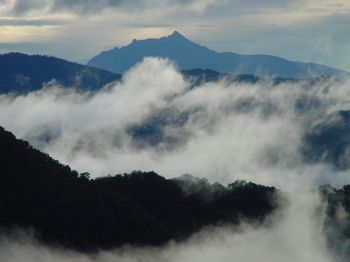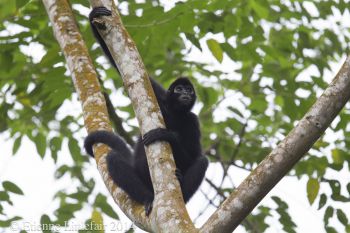
Los Cedros Biological Reserve
 Brown headed spider monkey © Etienne Littlefair
Brown headed spider monkey © Etienne Littlefair
In a landmark court case, Ecuador could soon become the first nation to use the 'Rights of Nature' in relation to protected forests.
In a precedent-setting move, the Constitutional Court of Ecuador has announced it will take on the case of the threatened Los Cedros Protected Forest, one of the most biologically diverse habitats in the world, against large-scale copper and gold mining.
Ecuador rewrote its Constitution in 2007-2008 and became the first nation to include the 'Rights of Nature' – but, until now, it has rarely been tested in a court of law.
Los Cedros, in north-western Ecuador, is one of the most biologically diverse habitats in the world, with more than 6,800 hectares (nearly 17,000 acres) of primary cloud forest. It protects over 200 species with high extinction risk, five of which are regarded as critically endangered by the Ecuadorian government.
But in recent years, the government have promoted large-scale metal mining without respecting the national network of Protected Forests or Indigenous Territories, placing those habitats and species under severe threat.
Dr Mika Peck, Senior Lecturer in Biology at the University of Sussex, will provide supplementary evidence in the court case to describe the importance of the reserve for critically endangered species.
In 2005, he started 'parabiologist training' at Los Cedros as part of DEFRA's Darwin Initiative which saw locals trained as primate and habitat ecologists in an effort to protect the critically endangered Brown-Headed Spider Monkey.
Dr Peck said: "Los Cedros is a truly amazing place.
"The remoteness and high-quality of the habitat explain why there are six species of cats and three species of primate, including some of the last critically endangered brown-headed spider moneys in the world – as well as the endangered Andean spectacled bear.
"But that's not all - new species are being discovered every year."
The reserve was established in 1988 with the help of a grant from the Australian Government's Development Assistance Bureau and the support of Australian not-for-profit organisation the Rainforest Information Centre.
Yet, despite its 'Protected Forest' status, Los Cedros, along with many other reserves in Ecuador, is under huge threat from mining, after the Ecuadorian government announced new concessions for mining exploration on over 2.4m hectares (6m acres) of land in 2017.
As part of a rapid mining expansion, BHP and Canadian mining company Cornerstone Capital Resources were given mining permits in collaboration with the Ecuadorian state mining company, ENAM. This was despite the Ministry of Environment's own publication citing Los Cedros in its 'Areas of Priority for the Conservation of Biodiversity in Ecuador'.
José DeCoux, the manager of Los Cedros said: "Mining in Protected Forests is a violation of the legal status of declared Protected Areas, the collective rights of indigenous peoples, the Rights of Nature, and the right of communities to prior consultation before potential environmental damages."
In June 2019, Los Cedros Protected Forest authorities won a case for an Action of Protection in the Provincial Court of Imbabura which stripped the mining companies of their operating permits.
Yet mining exploration continued within the protected area in direct contravention of the court order, despite overwhelming opposition in the region, and without the appropriate permits.
Now, with the Constitutional Court taking up the case, there are hopes that a balance can be found between economic gains and biodiversity conservation.
Edgar Merlo, who heads the legal team for Los Cedros, says: "The [Constitutional] Court's ruling in this case would be a first in Ecuador: on the Rights of Nature, the right to prior consultation of communities, and the right to legal certainty, since concessions were granted without respecting the declaration of protective forests.
"The final judgement by the Constitutional Court in this case could change the legal focus in Ecuador, South America, and the entire world on the Rights of Nature and the rights of local communities, so that mining concessions are not granted in Protected Forests."
Globally, this is a groundbreaking case where the legal team will attempt to evoke constitutional protections for nature at a national level to protect an ecosystem from large-scale mining. Ecuador remains the only country in the world to have enshrined these rights in its constitution. It is also a country that has recently attracted a massive amount of interest from transnational mining companies, who see vast potential in its mineral wealth, particularly copper and gold.
Dr Joanna Miller Smallwood, Research Fellow at the University of Sussex, commented: "Ecuador has taken the bold step of incorporating the 'Rights of Nature' in its constitution and the court has a crystal clear opportunity to set a strong precedent, underlining that mining in protected forests, including Los Cedros, violates national and international laws, including the 'Rights of Nature'. This ruling has important implications for the six million acres of protected forests in Ecuador and sets a strong precedent for other nations to follow.
"A clear opportunity to better address the global biodiversity and climate crisis is through the incorporation of the 'Rights of Nature' in legal frameworks, which provides nature with heightened legal protection. This is an opportunity for other nations to follow suit and move beyond the use of inadequate laws which only protect nature for its monetary worth, towards laws which incorporate more equitable understandings of nature that respect its intrinsic worth and recognise nature's fundamental importance for planetary processes."
With Los Cedros acting as a research base for scientists around the world, an active petition set up by Professor Bitty Roy (University of Oregon) against mining is currently gathering signatures and will form part of the evidence submitted to the court by Dr Mika Peck.






